|
Encyrtidae > Anagyrus fusciventris (Girault, 1915). Confirmed
|
|
| Maherjos |
Posted on 08-07-2011 00:33
|
|
Member Location: Posts: 2342 Joined: 02.09.09 |
Photograph taken on July 08, 2011, in terrace housing in urban areas in Motril, Granada, Spain. Immediate area of the Mediterranean coast. Approximate size, no antennae or tails <2 mm  Appreciate your cooperation for identification. Greetings Edited by Maherjos on 29-07-2012 09:34 |
|
|
|
| jorgemotalmeida |
Posted on 08-07-2011 02:46
|
|
Member Location: Posts: 9295 Joined: 05.06.06 |
Hymenoptera. It is a parasitic wasp. I'd say Chalcidoidea (superfamily). Encyrtidae? |
|
|
|
| Paul Beuk |
Posted on 08-07-2011 07:57
|
|
Super Administrator Location: Posts: 19208 Joined: 11.05.04 |
Encyrtidae it is.
Paul - - - - Paul Beuk on https://diptera.info |
|
|
|
| Maherjos |
Posted on 08-07-2011 10:51
|
|
Member Location: Posts: 2342 Joined: 02.09.09 |
jorgemotalmeida wrote: Hymenoptera. It is a parasitic wasp. I'd say Chalcidoidea (superfamily). Encyrtidae?  Hymenoptera!!!. Hymenoptera!!!.   What a mistake!. What a mistake!.   I'm hard-headed! I'm hard-headed!  Very thankful Jorge for me out of my mistake. Best regards. |
|
|
|
| Maherjos |
Posted on 08-07-2011 10:57
|
|
Member Location: Posts: 2342 Joined: 02.09.09 |
Paul Beuk wrote: Encyrtidae it is. Paul Beuk very grateful for the Forum to move it applies, and confirm the identification of its genre. Best regards. |
|
|
|
| HDumas |
Posted on 09-07-2011 18:10
|
|
Member Location: Posts: 184 Joined: 24.04.09 |
Hello, Could it be Gyranusoidea aphycoides? Greetings from Provence |
|
|
|
| Maherjos |
Posted on 09-07-2011 18:55
|
|
Member Location: Posts: 2342 Joined: 02.09.09 |
HDumas wrote: Hello, Could it be Gyranusoidea aphycoides? My thanks HDumas for their appreciated collaboration and assistance. Unfortunately, the web I have not found a single photograph to compare with Gyranusoidea aphycoides. I've only found a few, but very poor quality Gyranusoidea indicates, similar but not quite. I keep looking and edit the title to attract the attention of experts. Have you seen any pictures of Gyranusoidea aphycoides? Best Regards |
|
|
|
| HDumas |
Posted on 09-07-2011 19:42
|
|
Member Location: Posts: 184 Joined: 24.04.09 |
Your pics are really nice so I used Ponent keys: http://ponent.ats...rtidae.htm They led me to http://ponent.ats...ea_ana.htm The description of the genus fits well with you pics, so Gyranusoidea aphycoides seems to be a good hypothesis to me. But I'm not a specialist at all, so wait for experts. Pics of the genus Gyranusoidea: http://www.nhm.ac...p;isVideo= http://www.ipmima...um=5195093 Pics of the close genus Anagyrus: http://mrec.ifas....MANAGE.htm Edited by HDumas on 09-07-2011 19:46 Greetings from Provence |
|
|
|
| Sara21392 |
Posted on 09-07-2011 20:42
|
|
Member Location: Posts: 1445 Joined: 07.11.10 |
HDumas wrote: Your pics are really nice so I used Ponent keys: http://ponent.ats...rtidae.htm They led me to http://ponent.ats...ea_ana.htm The description of the genus fits well with you pics, so Gyranusoidea aphycoides seems to be a good hypothesis to me. But I'm not a specialist at all, so wait for experts. Pics of the genus Gyranusoidea: http://www.nhm.ac...p;isVideo= http://www.ipmima...um=5195093 Pics of the close genus Anagyrus: http://mrec.ifas....MANAGE.htm Hi Thank you very very much for site..   
Sincerely yours Sara |
|
|
|
| HDumas |
Posted on 11-07-2011 21:20
|
|
Member Location: Posts: 184 Joined: 24.04.09 |
According to Antoni Ribes it is Anagyrini for sure, most probably Gyranusoidea, with the long postmarginal vein and the appearance of thorax sculpture. But perhaps there is need to see under magnification the thorax to be sure if the sculpture type fits with the genus. About the species G.aphycoides, it is simillar with the colour description from Mercet (1921), at least in the upper surface, but it seems to be some differences in legs colour, and mostly in antenna colour. G.aphycoides has "base and apical third of scape whitish; apex of pedicellus whitish", and in photo there is only a subapical whitish patch in scape. Many thanks to him. Greetings from Provence |
|
|
|
| Maherjos |
Posted on 29-07-2012 09:51
|
|
Member Location: Posts: 2342 Joined: 02.09.09 |
This year again I was photographing this little insect. And again I consulted a specialist in Chalcidoidea, Encyrtidae, Antoni Ribes Escolà. And with the new information that I could provide, if the expert has been able to establish a more precise identification. This is what the expert tells me: Species not mentioned even in Spain, although you know some specimens collected in citrus groves, unpublished. Pseudococcidae numerous parasitoid mainly longispinus Pseudococcus, P.calceolariae, Planococcus citri also, Phenacoccus gossypii, Ferrisia virgata, etc., On citrus and other tropical areas of coffee, avocado, etc.. It is of Australian origin, and introduced for biological control of pests in Hawaii, California, Africa, and recently in Italy and Israel. " I'm also the photos that I have done this year. Best regards. |
|
|
|
| Maherjos |
Posted on 29-07-2012 09:52
|
|
Member Location: Posts: 2342 Joined: 02.09.09 |
. |
|
|
|
| HDumas |
Posted on 30-07-2012 09:21
|
|
Member Location: Posts: 184 Joined: 24.04.09 |
Great! Thanks for this correction. This species indeed is reared and used for biological control, see here in Holland for example. Greetings from Provence |
|
|
|
| Jump to Forum: |


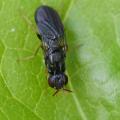



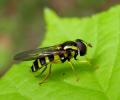
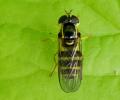

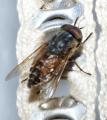
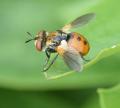



 but don't see the image in the post.
but don't see the image in the post.